Key takeaways:
- Societal norms shape beliefs, often pressuring individuals to conform, which can suppress dissenting opinions.
- The death penalty debate involves moral, ethical, and practical concerns, particularly its impact on marginalized communities.
- Opposition to the death penalty is supported by arguments about wrongful convictions, financial burdens on taxpayers, and failure to address crime’s root causes.
- Advocating for change through personal narratives, open discussions, and collaboration with organizations can effectively challenge societal norms surrounding the death penalty.
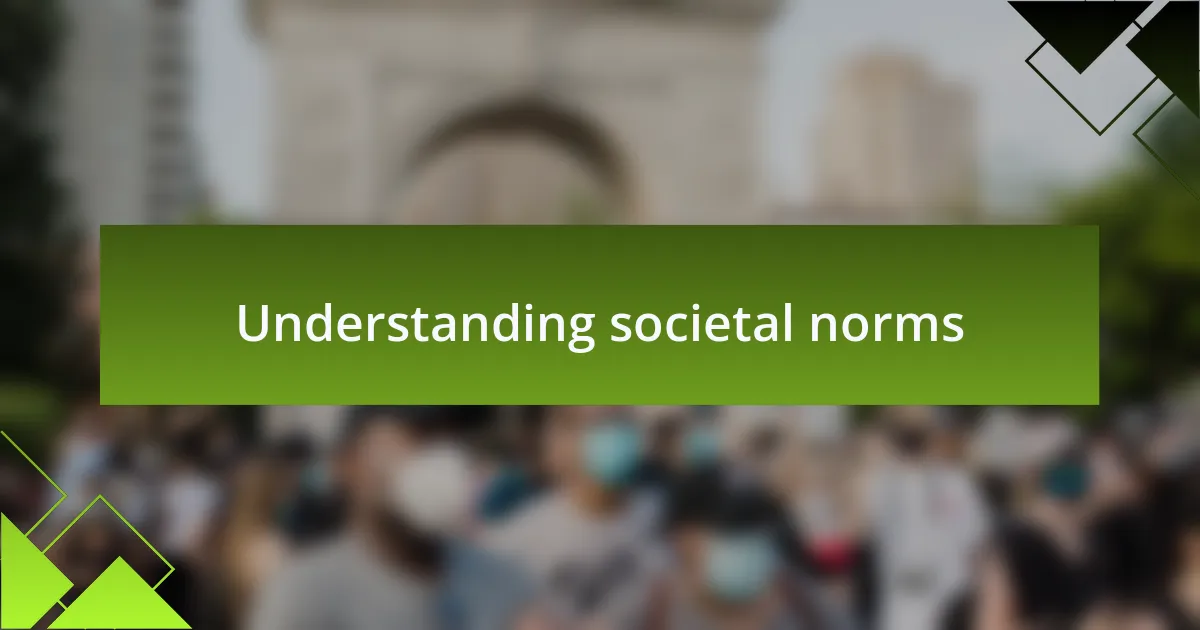
Understanding societal norms
Societal norms shape our perceptions and values, acting as an invisible framework through which we understand the world. I often find myself pondering the origins of these norms: how did they come to be accepted as unchangeable truths? It’s a fascinating thought—sometimes, I feel like we all get swept away in the current, unquestioningly following beliefs we never chose for ourselves.
Reflecting on my experiences, I can recall moments when I felt pressured to conform. One time, I attended a gathering where everyone applauded traditional views on punishment. I felt like an outsider for questioning the morality of capital punishment. Those emotions—the tension between belonging and standing firm in my beliefs—highlight how societal expectations can pressure us to silence our truths.
Navigating these norms can be daunting, especially when they contradict our personal beliefs. When I stand up against them, I often wonder: what if more of us began to voice our dissent? Each small act of courage can inspire deeper conversations and, perhaps, gradually shift the very fabric of our societal expectations.
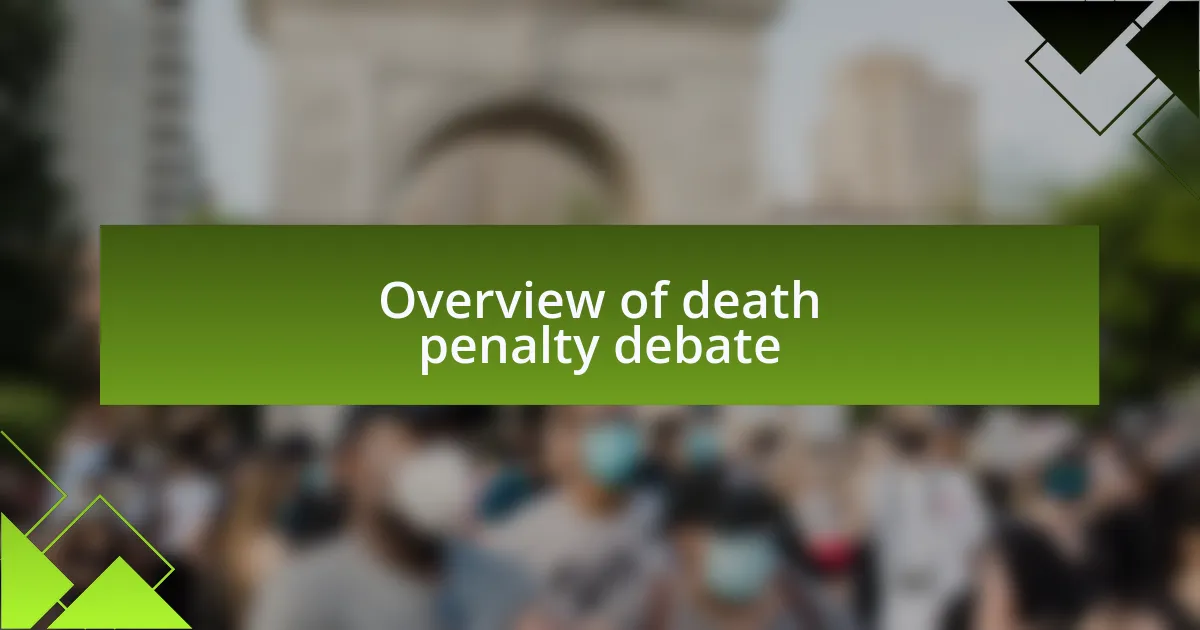
Overview of death penalty debate
The death penalty debate encompasses a wide array of perspectives, ranging from moral and ethical considerations to questions of effectiveness in deterring crime. I remember engaging in a passionate discussion with friends, where one argued that the fear of execution keeps potential criminals in check. But does it really? Statistics show that states with capital punishment don’t necessarily have lower crime rates. This realization left me questioning how much influence actual data has on our beliefs.
Advocates for the death penalty often cite retribution and justice for victims’ families as primary reasons for their stance. I once spoke to a victim’s family member who felt that capital punishment was the only fitting response to their loved one’s murder. However, their pain and desire for justice also made me reflect on the brokenness of our justice system. Is it right to seek closure through a cycle of violence?
On the flip side, opponents argue that the death penalty is flawed and disproportionately affects marginalized communities. This is a sentiment I resonate with deeply. It makes me uncomfortable to think that my neighbors could be subject to a system that is unfairly weighted against them. As I explore this debate further, I find myself grappling with a potent question: how can we claim to uphold justice when our very methods of punishment may be unjust?
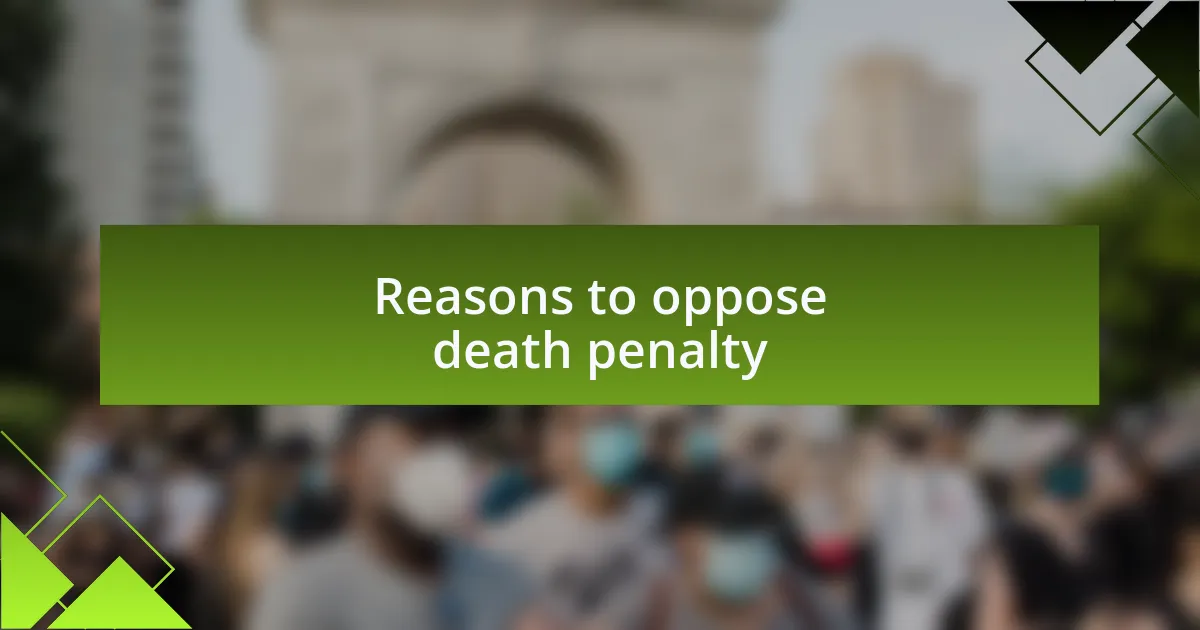
Reasons to oppose death penalty
One compelling reason to oppose the death penalty lies in its irrevocability. I once met a former inmate who spent years on death row for a crime he didn’t commit. His story filled my heart with a profound fear of the system’s fallibility. How many innocent lives could be lost forever because of a wrongful conviction? The thought is chilling and serves as a stark reminder that once the sentence is carried out, there is no way to rectify the mistake.
Another poignant reason against capital punishment is its financial burden on taxpayers. I learned that the costs associated with death penalty cases—legal fees, lengthy trials, and extended appeals—often far exceed those of life imprisonment. Isn’t it striking that our tax dollars are spent on perpetuating a cycle of violence instead of investing in preventive measures and rehabilitation programs? This raises an important question about our priorities as a society.
Lastly, the death penalty fails to address the root causes of crime. Reflecting on my experiences volunteering at a community center, I realized that many individuals turn to crime due to systemic issues like poverty and lack of education. Why do we continue to focus on punishment rather than seeking solutions that could uplift communities? To me, it seems we are missing the opportunity to break the cycle of violence with compassion and understanding.
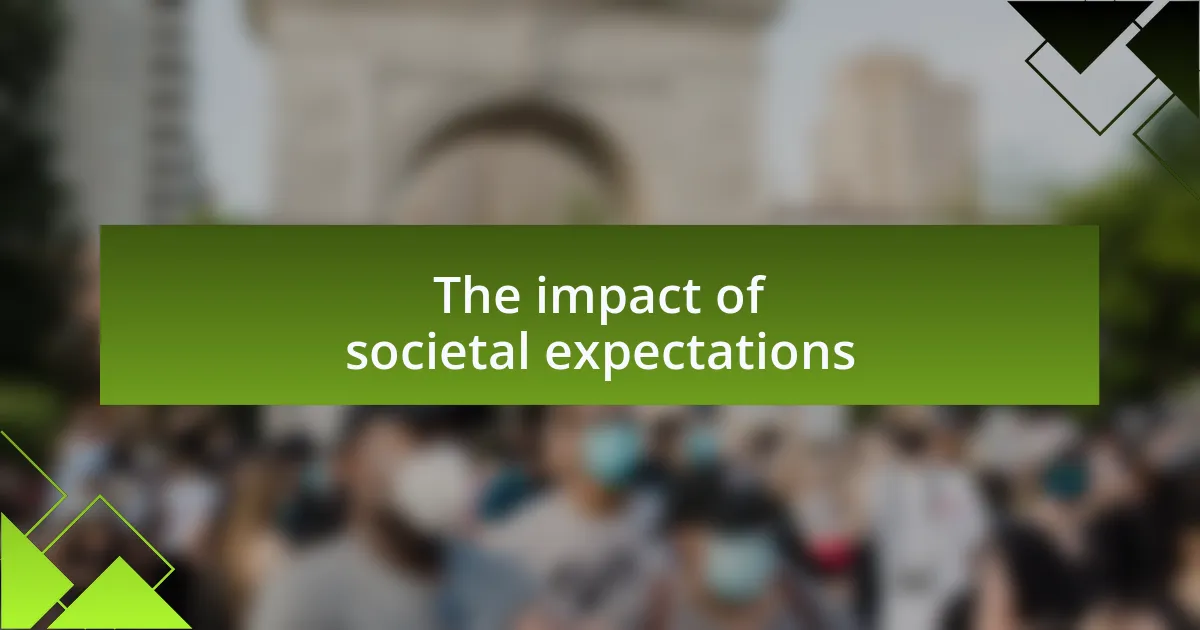
The impact of societal expectations
Societal expectations can exert a powerful influence on our perception of the death penalty. I recall a conversation with a close friend who firmly believed that capital punishment was an essential tool for justice. It struck me how deeply ingrained cultural beliefs can shape our views, often blinding us to the nuances of morality and human rights. What happens when we dare to question these societal scripts?
Many people feel compelled to conform to these norms, fearing backlash or ridicule for dissenting opinions. I experienced this firsthand when I voiced my opposition to the death penalty during a community meeting. The silence that followed felt heavy, as if I had breached an unspoken code. How many voices are stifled by the fear of social reprisal?
Yet, challenging societal expectations can lead to meaningful change. I joined a local advocacy group where members shared personal stories and experiences, shedding light on the complexity of life and death decisions. It became clear that when we come together and confront these norms, we foster an environment that encourages dialogue and re-evaluation of our values. In this way, we can collectively redefine what justice truly means in our society.
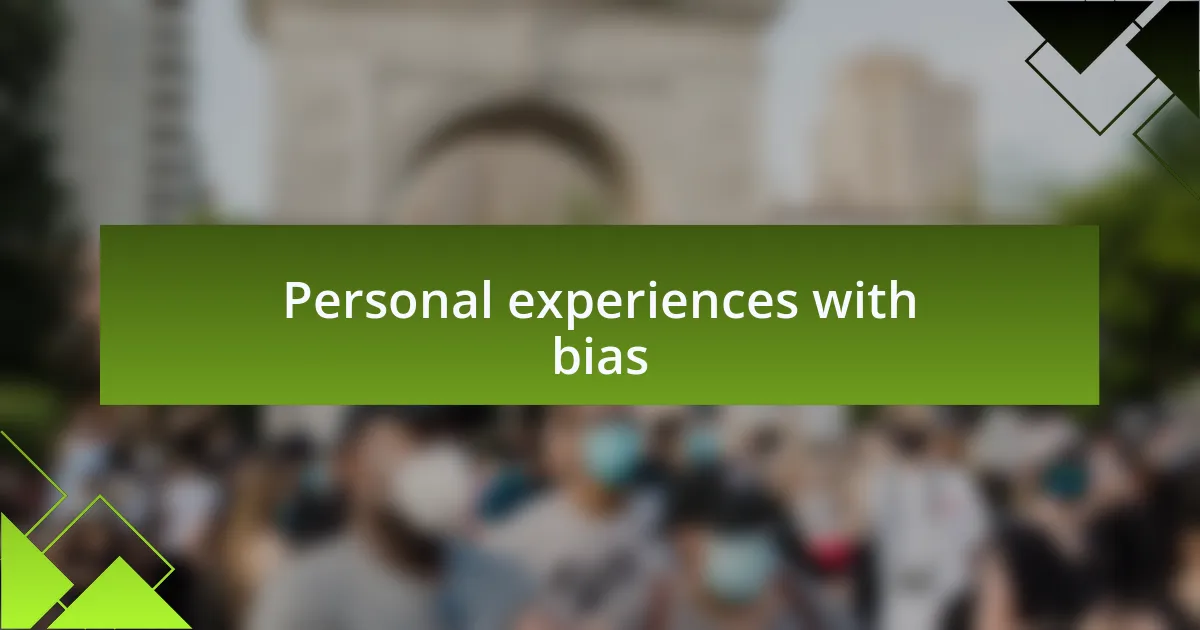
Personal experiences with bias
I often find myself reflecting on a moment during my college years when a professor casually mentioned the death penalty as a societal necessity. The overwhelming agreement in the room hinted at a shared bias that left me unsettled. Why is it so easy to accept a viewpoint without questioning its roots?
Another vivid experience occurred at a family gathering, where the subject came up during dinner. I cautiously shared my perspective against capital punishment, and the response was immediate: a mix of disbelief and frustration. It was a stark reminder of how biases can be so deeply embedded that they trigger defensive reactions, stifling open conversation. I often wonder how many important discussions never happen because people feel pressured to align with prevailing beliefs.
In my attempts to confront these biases, I started engaging with diverse groups online, exploring grounds far removed from my initial beliefs. Each interaction challenged my own understanding and pushed me to reflect on the stories behind the statistics. How much richer would our conversations be if we embraced complexity instead of retreating into the comfort of consensus?
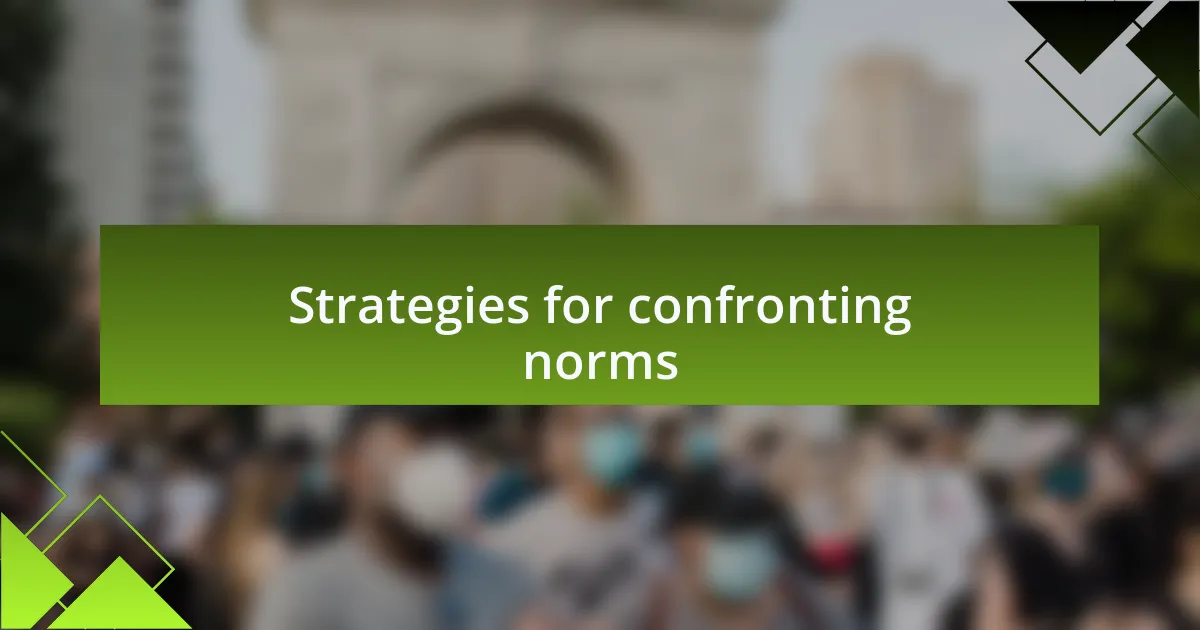
Strategies for confronting norms
One effective strategy I’ve embraced is sharing personal narratives that illuminate the failures of the death penalty. During a debate at a local community center, I recounted the story of a wrongly convicted man who spent years on death row. By connecting emotionally with the audience through a real-life example, I found that many began to question their previously unexamined beliefs. Isn’t it fascinating how personal stories can spark empathy and shift perspectives?
Another approach that has worked well for me is fostering open discussions in safe spaces. I often host informal gatherings where friends and family can discuss controversial topics without fear of judgment. I remember one evening when I gently guided the conversation towards the moral implications of capital punishment. By creating an environment of trust, I noticed that even the most reluctant individuals started to share their thoughts, revealing doubts about their beliefs. How often do we miss opportunities for meaningful dialogue because we’re afraid of pushing boundaries?
Lastly, I advocate for educating myself and enabling others to do the same. I believe that knowledge is a powerful tool against ingrained societal norms. By arranging book clubs focused on anti-death penalty literature, I’ve seen people challenge their assumptions and engage with the complexities of justice. Isn’t it empowering to see how knowledge can transform conversations and inspire action?
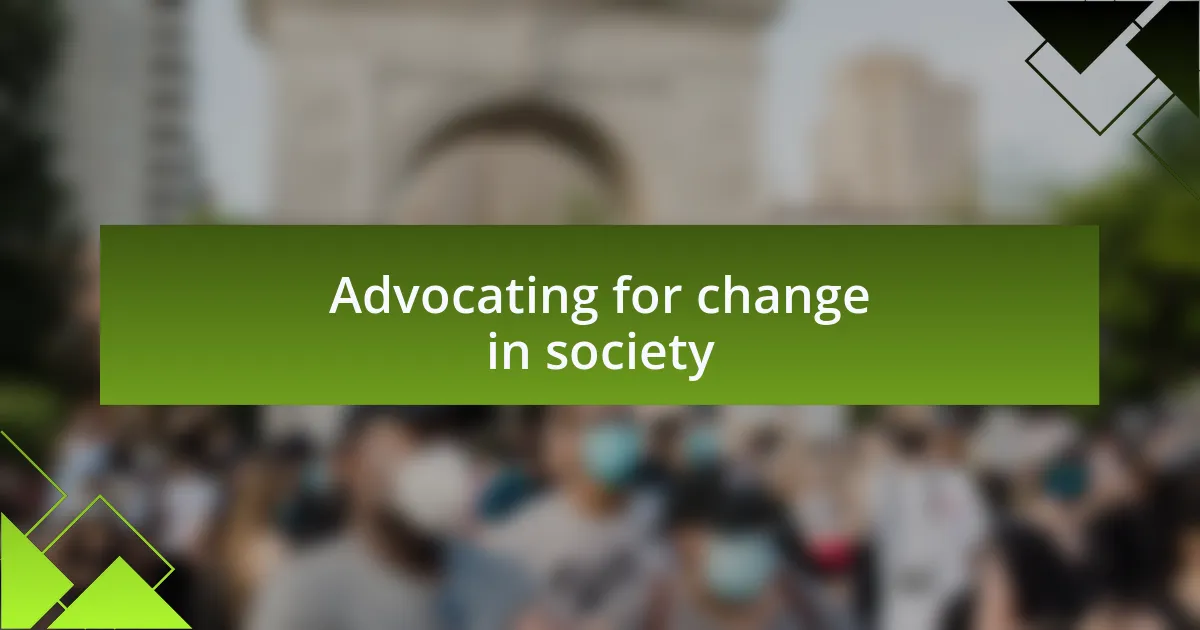
Advocating for change in society
When advocating for change in society, I’ve discovered that engaging with diverse audiences can lead to unexpected insights. At a town hall meeting, I presented statistics about wrongful convictions alongside personal testimonials from families affected by the death penalty. Witnessing faces shift from indifference to concern fueled my passion; it reminded me how essential it is to expose people to different perspectives. How often do we take the time to truly listen to the experiences of others, especially when they challenge our beliefs?
I also find that collaborating with local organizations amplifies our voices in the fight against the death penalty. Recently, I partnered with a grassroots group to organize a public awareness campaign. Together, we hosted workshops and distributed informative pamphlets, igniting conversations in our community. The enthusiasm and camaraderie we shared made me realize that change isn’t just about individual efforts; it’s about building a collective movement. Isn’t it inspiring how collaborative efforts can make issues feel less daunting?
Lastly, using social media as a platform for advocacy has been a game-changer for me. I regularly share infographics and poignant quotes that resonate with my beliefs around capital punishment. One day, a simple post I made sparked a passionate discussion that reached hundreds of people who felt isolated in their views. Engaging with my online community not only fostered awareness but created a sense of solidarity among those who are equally committed to reform. How powerful can a virtual platform be in igniting real-world change?